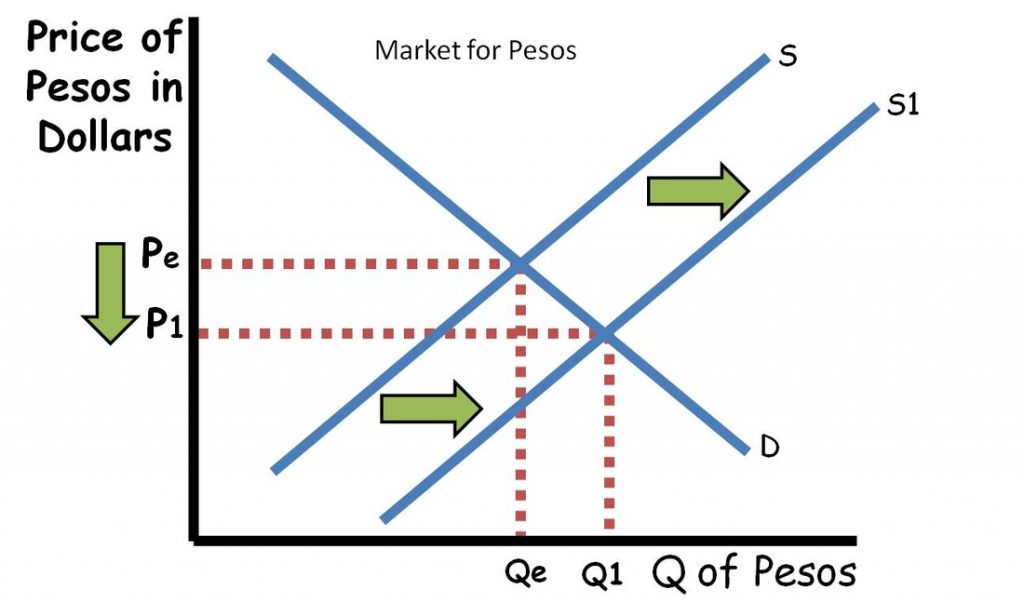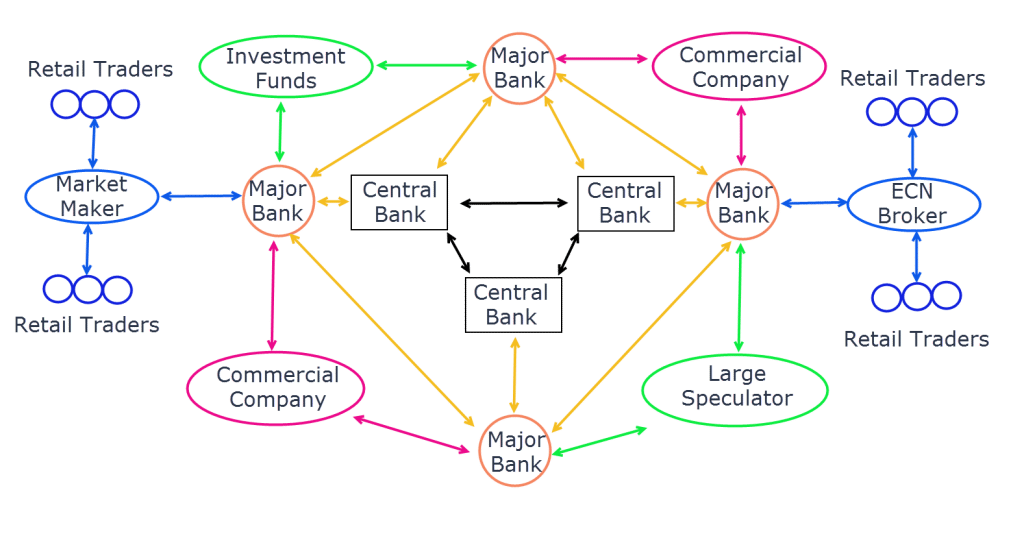The foreign exchange market basics - Welcome to the fascinating world of the foreign exchange market, where currencies dance to the rhythm of global finance. In this comprehensive guide, we'll delve into the basics of forex trading, exploring the factors that shape currency values, the types of transactions, financial instruments, and risk management strategies involved in this dynamic market.
Definition and Overview of the Foreign Exchange Market

The foreign exchange market (Forex or FX market) is a global decentralized market for the trading of currencies. It is the largest financial market in the world, with an estimated daily trading volume of over $5 trillion. The FX market facilitates the exchange of currencies for international trade, investment, and tourism.
When investigating detailed guidance, check out foreign exchange market questions and answers pdf now.
Participants in the foreign exchange market include banks, investment firms, corporations, central banks, and retail traders. Banks play a dominant role as market makers, providing liquidity and facilitating currency transactions for their clients. Investment firms and corporations use the FX market to manage currency risk associated with international investments and operations.
Factors Influencing Currency Exchange Rates
Exchange rates between currencies are influenced by a complex interplay of economic, political, and social factors. Understanding these factors is crucial for businesses and individuals engaged in international trade and investments.
Economic Factors
Economic factors play a significant role in determining currency exchange rates. These include:
- Interest rates: Higher interest rates in a country attract foreign investment, increasing demand for the local currency and appreciating its value.
- Inflation: High inflation erodes the purchasing power of a currency, making it less desirable and leading to depreciation.
- Economic growth: Strong economic growth prospects attract foreign investment and boost the demand for a currency.
- Trade balance: A country with a persistent trade deficit experiences a higher demand for foreign currencies to pay for imports, depreciating its currency.
Political Factors
Political stability and events can also impact exchange rates. For instance:
- Political instability: Uncertainty about a country's political future can lead to investors selling its currency, causing depreciation.
- Government policies: Changes in monetary and fiscal policies can influence exchange rates.
- International relations: Tensions or conflicts between countries can affect the demand for their currencies.
Social Factors
Social factors, such as population demographics and cultural trends, can also have an indirect impact on exchange rates.
- Population growth: Increasing population can lead to higher demand for goods and services, boosting economic growth and potentially appreciating the currency.
- Cultural trends: Changes in consumer preferences and spending habits can affect the demand for specific goods and services, influencing the exchange rates of countries that produce or export those goods.
Supply and Demand, The foreign exchange market basics
Ultimately, currency exchange rates are determined by the interplay of supply and demand. When demand for a currency exceeds supply, its value appreciates. Conversely, when supply exceeds demand, its value depreciates.
Factors that influence supply and demand include:
- Economic fundamentals: Economic factors mentioned above influence the demand for a currency.
- Central bank intervention: Central banks can buy or sell their own currency to stabilize exchange rates.
- Speculation: Currency traders and investors can speculate on future exchange rate movements, creating fluctuations in demand and supply.
Types of Foreign Exchange Transactions

The foreign exchange market facilitates various types of transactions, each serving specific purposes and catering to different needs. These transactions can be broadly categorized into three main types: spot, forward, and swap contracts.
Spot Transactions
Spot transactions involve the immediate exchange of currencies at the prevailing market rate. They are typically settled within two business days of the trade date. Spot transactions are suitable for businesses or individuals who need to convert currencies for immediate use or payment.
- Advantages: Immediate execution, no commitment beyond settlement date.
- Disadvantages: Exposed to fluctuations in exchange rates until settlement.
Forward Transactions
Forward transactions are contracts to exchange currencies at a predetermined rate on a future date. They allow businesses to lock in an exchange rate for a future transaction, reducing the risk of adverse currency movements. Forward contracts are typically customized to meet the specific needs of the parties involved.
- Advantages: Hedge against currency risk, certainty of exchange rate for future transactions.
- Disadvantages: Commitment to the agreed-upon rate, potential for losses if market rates move favorably.
Swap Transactions
Swap transactions involve the simultaneous exchange of currencies with an agreement to reverse the transaction at a future date. Swap contracts are often used for hedging purposes or to take advantage of interest rate differentials between different currencies.
- Advantages: Flexibility, allows for customized transactions, can reduce transaction costs.
- Disadvantages: Complexity, requires understanding of both currency and interest rate markets.
Foreign Exchange Market Instruments

The foreign exchange market involves a diverse range of financial instruments, each tailored to specific needs and strategies. These instruments enable market participants to manage risk, speculate on currency movements, and facilitate international trade and investment.
Among the most commonly used foreign exchange market instruments are currency pairs, futures, and options.
Currency Pairs
Currency pairs represent the foundation of the foreign exchange market. They involve the exchange of one currency for another, with the value of one currency quoted in terms of the other. Currency pairs are typically denoted using three-letter currency codes, such as EUR/USD (Euro vs. US Dollar) or GBP/JPY (British Pound vs. Japanese Yen).
Currency pairs offer a direct way to speculate on the relative value of two currencies. Traders can buy or sell a currency pair based on their expectations of future exchange rate movements.
Finish your research with information from foreign exchange market elements.
Futures
Foreign exchange futures are standardized contracts that obligate the buyer to purchase a specified amount of a currency at a predetermined exchange rate on a future date. Futures contracts are traded on exchanges and provide a means for locking in exchange rates and managing risk.
Futures are particularly useful for businesses and investors who need to hedge against currency fluctuations. By entering into a futures contract, they can secure a future exchange rate, protecting themselves from adverse currency movements.
Options
Foreign exchange options grant the buyer the right, but not the obligation, to buy or sell a specified amount of a currency at a predetermined exchange rate on or before a future date. Options provide flexibility and allow traders to speculate on currency movements without the obligation to complete the transaction.
Options are often used for hedging purposes or to speculate on the direction of currency movements. They offer a range of strategies, including the ability to limit potential losses and enhance potential profits.
Obtain access to foreign exchange market meaning and concept to private resources that are additional.
Risk Management in the Foreign Exchange Market
Risk management is crucial in the foreign exchange market due to its inherent volatility and uncertainty. Forex traders face various risks, including currency risk, interest rate risk, political risk, and liquidity risk.Currency Risk
Currency risk arises from fluctuations in exchange rates. Unfavorable exchange rate movements can lead to losses on investments or transactions. Traders can manage currency risk through hedging strategies, such as forward contracts, options, and currency swaps.Interest Rate Risk
Interest rate risk stems from changes in interest rates, which affect the value of fixed-income investments. Traders can mitigate interest rate risk by diversifying their portfolios across different currencies with varying interest rate environments.Political Risk
Political risk involves the impact of political events, such as wars, elections, and policy changes, on currency values. Traders can assess political risk by monitoring news and political developments in relevant countries.Liquidity Risk
Liquidity risk refers to the difficulty in buying or selling a currency quickly and at a fair price. Traders can manage liquidity risk by choosing liquid currencies with high trading volumes.Foreign Exchange Market Regulation: The Foreign Exchange Market Basics
The foreign exchange market, being a complex and dynamic environment, requires effective regulation to ensure its stability and integrity. This regulation is carried out by various authorities, including central banks and other regulatory bodies, which establish frameworks and guidelines to govern the market's operations.
Central banks play a crucial role in regulating the foreign exchange market. They are responsible for managing monetary policy, which includes setting interest rates and controlling the supply of money in the economy. These actions can significantly impact currency exchange rates and overall market conditions.
Role of Central Banks
- Monetary Policy Management: Central banks set interest rates and implement quantitative easing or tightening measures to influence the value of their currencies.
- Foreign Exchange Intervention: Central banks may intervene in the foreign exchange market by buying or selling currencies to stabilize exchange rates and manage volatility.
- Regulation of Financial Institutions: Central banks supervise and regulate financial institutions involved in foreign exchange transactions to ensure their compliance with regulations and risk management practices.
Role of Other Regulatory Bodies
In addition to central banks, other regulatory bodies also play a role in regulating the foreign exchange market. These bodies include:
- Financial Conduct Authority (FCA) in the United Kingdom
- Securities and Exchange Commission (SEC) in the United States
- Swiss Financial Market Supervisory Authority (FINMA) in Switzerland
These regulatory bodies establish rules and regulations to govern the conduct of participants in the foreign exchange market, including brokers, dealers, and investment firms. They enforce these regulations to ensure fair and orderly trading practices, prevent market manipulation, and protect investors from fraud and abuse.
Summary
As we conclude our journey through the foreign exchange market basics, remember that knowledge is the key to navigating this complex and ever-evolving landscape. Whether you're a seasoned trader or just starting your forex adventure, understanding these fundamentals will empower you to make informed decisions and seize opportunities in the global currency market.
